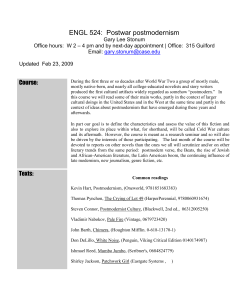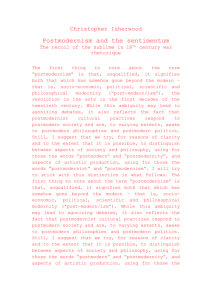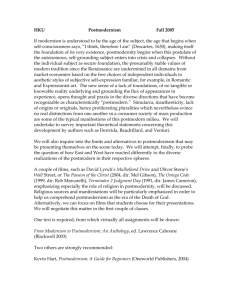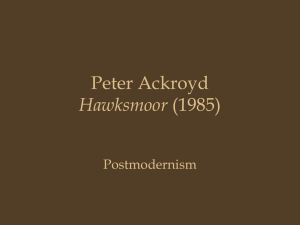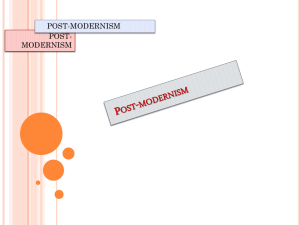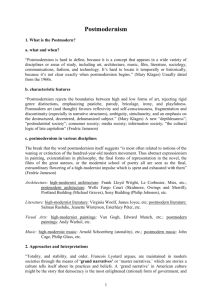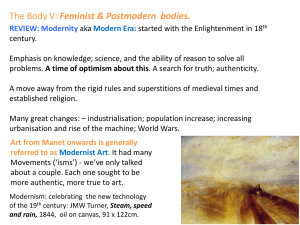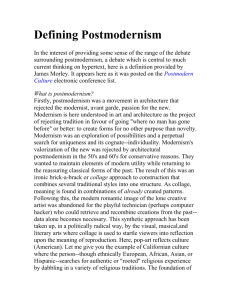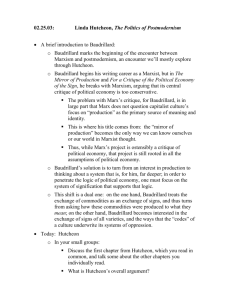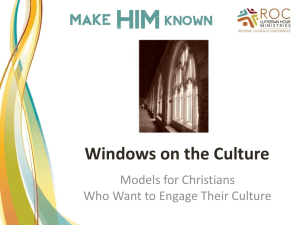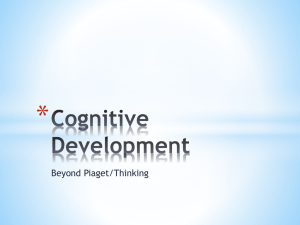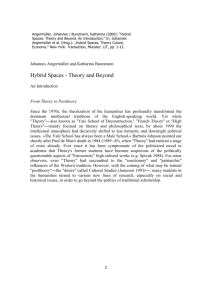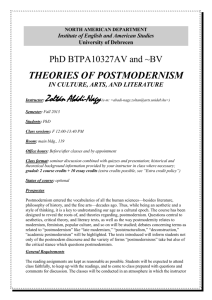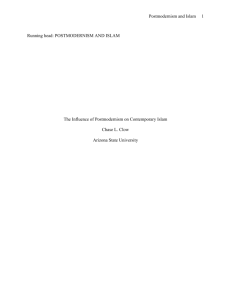Postmodernism - Shock and Awe Us
advertisement
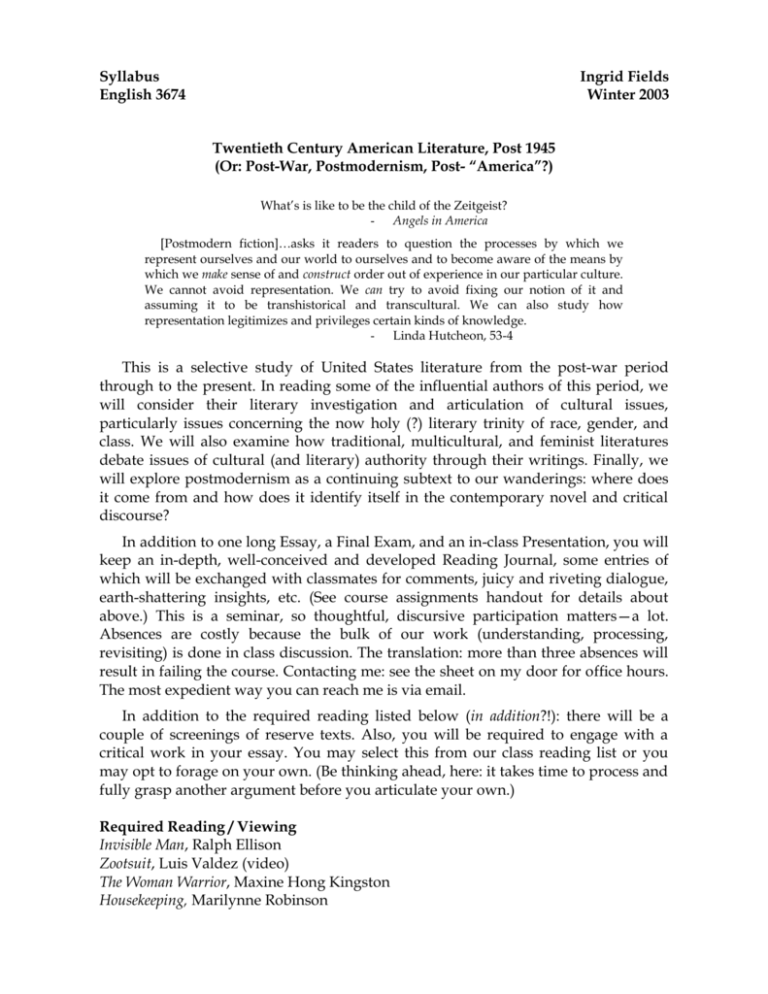
Syllabus English 3674 Ingrid Fields Winter 2003 Twentieth Century American Literature, Post 1945 (Or: Post-War, Postmodernism, Post- “America”?) What’s is like to be the child of the Zeitgeist? - Angels in America [Postmodern fiction]…asks it readers to question the processes by which we represent ourselves and our world to ourselves and to become aware of the means by which we make sense of and construct order out of experience in our particular culture. We cannot avoid representation. We can try to avoid fixing our notion of it and assuming it to be transhistorical and transcultural. We can also study how representation legitimizes and privileges certain kinds of knowledge. - Linda Hutcheon, 53-4 This is a selective study of United States literature from the post-war period through to the present. In reading some of the influential authors of this period, we will consider their literary investigation and articulation of cultural issues, particularly issues concerning the now holy (?) literary trinity of race, gender, and class. We will also examine how traditional, multicultural, and feminist literatures debate issues of cultural (and literary) authority through their writings. Finally, we will explore postmodernism as a continuing subtext to our wanderings: where does it come from and how does it identify itself in the contemporary novel and critical discourse? In addition to one long Essay, a Final Exam, and an in-class Presentation, you will keep an in-depth, well-conceived and developed Reading Journal, some entries of which will be exchanged with classmates for comments, juicy and riveting dialogue, earth-shattering insights, etc. (See course assignments handout for details about above.) This is a seminar, so thoughtful, discursive participation matters—a lot. Absences are costly because the bulk of our work (understanding, processing, revisiting) is done in class discussion. The translation: more than three absences will result in failing the course. Contacting me: see the sheet on my door for office hours. The most expedient way you can reach me is via email. In addition to the required reading listed below (in addition?!): there will be a couple of screenings of reserve texts. Also, you will be required to engage with a critical work in your essay. You may select this from our class reading list or you may opt to forage on your own. (Be thinking ahead, here: it takes time to process and fully grasp another argument before you articulate your own.) Required Reading / Viewing Invisible Man, Ralph Ellison Zootsuit, Luis Valdez (video) The Woman Warrior, Maxine Hong Kingston Housekeeping, Marilynne Robinson Angels in America: Millennium Approaches, Tony Kushner Angels in America: Perestroika, Tony Kushner The Book of Daniel, E.L. Doctorow Required Reading on Reserve “Defining the Postmodern,” Jean-François Lyotard “Recitatif,” Toni Morrison “Postmodern Blackness,” bell hooks “The Age of White Guilt and the Disappearance of the Black Individual,” Shelby Steele “Commitment From the Mirror-Writing Box,” Trinh T. Minh-ha “Beginning to Theorize Postmodernism,” Linda Hutcheon & “Toward a Concept of Postmodernism,” Ihab Hassan Selection from “Public Access,” Michael Bérubé” “ Not ‘Anyone’s Daughter,’” Nancy Isenberg True West, Sam Shepard “Howl,” Allen Ginsberg Berkeley in the Sixties, Mark Kitchell (video) “Re-presenting the Past,” Selection from The Politics of Postmodernism, Linda Hutcheon READING SCHEDULE: Readings are grouped into thematic as opposed to chronological associations; it seems appropriate to disrupt the chronology of “history” here in favor of a pastiche of the changes and shifts in form, identity, politics, and voice since 1945. However, since we succumb to the tyranny of order in one way or another, I thought the roman numerals were a nice touch. [P] = student presentation I. Battling on All Fronts: Race (Gender) and the Self in America M Jan 6: Introduction: “Defining the Postmodern,” Jean-François Lyotard (1989) & Postmodernism handout #1 & Natoli handout, Postmodernism #2 W 8: Invisible Man, Ralph Ellison (1947 “Battle Royal”; 1952 - novel) M 13: Invisible Man W 15: Invisible Man [P] • Journal due M 20: MLK Holiday W 22: “Recitatif,” Toni Morrison (197?) and “Postmodern Blackness,” bell hooks (1990), “The Age of White Guilt and the Disappearance of the Black Individual,” Shelby Steele, 2002 • Screen Zootsuit, (R) (optional and suggested viewing: Bamboozled, Spike Lee) M 27: Zootsuit, Luis Valdez (1981) [P] W 29: The Woman Warrior, Maxine Hong Kingston (1975) M Feb 3: The Woman Warrior [P] W 5: The Woman Warrior and Trinh T. Minh-ha, “Commitment From the MirrorWriting Box” (1989) [P] • Journal due M 10: “Beginning to Theorize Postmodernism,” Linda Hutcheon & “Toward a Concept of Postmodernism,” Ihab Hassan, & “Public Access,” Michael Bérubé” W 12: True West, Sam Shepard (1981) [P] II. The Invisibility of Class (Bounds) in America M 17: Housekeeping, Marilynne Robinson (1981) W 19: Housekeeping [P] M 24: “ Not ‘Anyone’s Daughter,’” Nancy Isenberg (2000) (R) [P] W 26: “Howl” and “A Supermarket in California,” Allen Ginsberg (1955) [P] • TBA – Required Peer Review, Essay M Mar 3: “Howl” [P] W 5: Angels in America: Millennium Approaches, Tony Kushner (1992) [P] • Essay due (in class) III. Legacies: The Politics of History in Postmodern America Spring Break M 17: Angels in America: Millennium Approaches [P] W 19: Angels in America: Perestroika, Tony Kushner (1992/1994) [P] M 24: Angels in America: Perestroika [P] • Journal due • Screen Berkeley in the Sixties (R) W 26: Berkeley in the Sixties, Mark Kitchell (1990) (R) [P] TH 27: Reading by Delcamp Visiting Writer, Elizabeth Alexander M 31: “Re-presenting the Past,” Linda Hutcheon, The Politics of Postmodernism (1989) (R) • Quiz W Apr 2: The Book of Daniel, E.L. Doctorow (1971) [P] M 7: The Book of Daniel [P] • Journal for portfolio Journal Portfolio due W 9: The Book of Daniel & Conclusions (Evaluations) • Take Home Final Exam due Monday April 14th, 9:00 a.m. Suggested Reading (for your own research purposes, for fun, or simply to torture yourself): Primary Reading: M. Butterfly, David Hwang Fishboy, Mark Richard The Handmaid’s Tale, Margaret Atwood Libra and Underworld, Don DeLillo The Antelope Wife, Louise Erdrich Empire of the Senseless, Kathy Acker A Prayer for Owen Meany, John Irving Stray Toasters, Bill Sienkiewicz Cambodia: A Book for People Who Find Television Too Slow, Brian Fawcett Critical Reading: (There are other articles I might suggest if you have a particular idea of what you’re looking for . . .) “The Value of Narrativity in the Representation of Reality,” Hayden White “Make My Day! Spectacle as Amnesia in Imperial Politics,” Michael Rogin, Cultures of United States Imperialism, Amy Kaplan and Donald Pease, eds. “Ronald Reagan: The Movie, ”Ronald Reagan: The Movie and other Episodes in Political Demonology, Michael Rogin “Postmodernism, or The Cultural Logic of Late Capitalism,” Frederic Jameson “Periodising the Sixties,” Frederic Jameson “On Interpretation,” The Political Unconscious, Frederic Jameson. “The Precession of Simulacra,” Simulacra and Simulation, Jean Baudrillard “The Work of Art in the Age of Mechanical Reproduction,” Illuminations, Walter Benjamin “Questions of Multiculturalism,” Gayatri Spivak and Sneja Gunew, The Cultural Studies Reader, ed. Simon During Blasted Allegories, ed. E. Ann Kaplan Discourses: Conversations in Postmodern Art and Culture, eds. Russel Ferguson, William Olander, Marcia Tucker, and Karen Fiss The Politics of Postmodernism, Linda Hutcheon Discipline and Punish, Michel Foucault Epistemology of the Closet, Eve Sedgwick [Introductory chapter]
